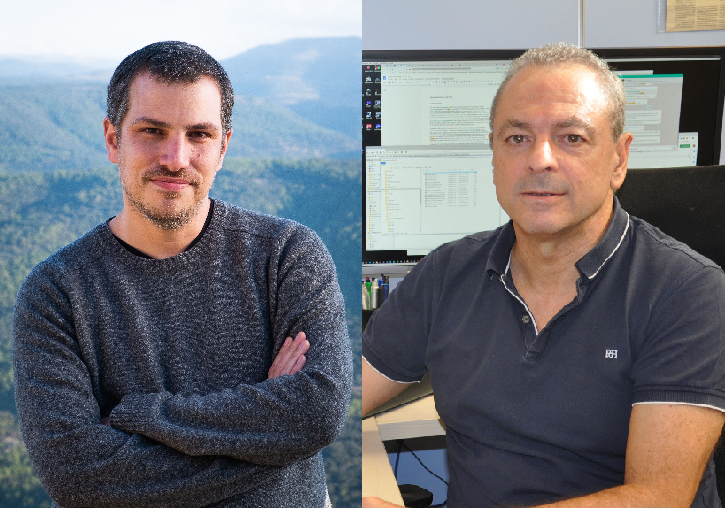Users
Social media
- More details here...
- Address
Parc Científic de la Universitat de València C/
Catedrático Agustín Escardino, 9
46980 Paterna (Valencia) Spain - Email:
iu.i2sysbio@uv.es - Phone:
(+34) 963544810
- Address
Links
Summer mobility and less severe controls spread the SARS-CoV-2 variant detected in Spain in 2020 throughout Europe

Investigation
Summer mobility and less severe controls spread the SARS-CoV-2 variant detected in Spain in 2020 throughout Europe

The University of Valencia (UV), the Foundation for the Promotion of Health and Biomedical Research of the Valencian Community (Fisabio) and the Higher Council for Scientific Research (CSIC) have participated in an international investigation, published in the journal Nature, which explains how the SARS-CoV-2 variant Initially detected in Spain, it became the predominant one in several European countries during 2020. The work, in which Fernando González (professor of Genetics at the UV and researcher at Fisabio) and Iñaki Comas (CSIC) participate, is from the SeqCOVID consortium, which has more than 17,000 samples of the virus sequenced.
The variant whose transmission is traced is the one called 20E.EU1. Its mutation lies in a modification of the spike protein, which is what allows SARS-CoV-2 to enter cells. The research was questioned because, without evidence having been found that this variation increases transmissibility, it ended up spreading to a dozen countries in Europe.
Fernando González, also responsible for the Joint Research Unit in Infection and Public Health of the FISABIO-Universitat de València Foundation, explains that “this research provides relevant information on how the transmission of SARS-CoV-2 behaves and evolves, in which it is not essential that one variant be more transmissible than another to end up imposing itself in different countries, as well as on the actions that can be taken to limit its expansion.”
The evolutionary history of this variant indicates that it was the most prevalent in Spain in July and August 2020. At the end of August, samples had already been sequenced in Belgium, Switzerland, France, Denmark, the United Kingdom, Germany, Latvia, Sweden, Norway and Italy. Furthermore, between August and October, samples of this variant were detected in Hong Kong, Australia, New Zealand and Singapore, probably exported from Europe.
In mid-July, a month after the first sample was found in Spain, this variant already represented 80% of the samples sequenced in the country. Four months later, it was already found in more than 60% of the samples from other countries such as Ireland, the United Kingdom or Italy.
The research indicates that the causes of transmission across the European continent were the reactivation of travel between these countries and the lack of continence and more severe controls to maintain the spread of the virus. This variant was the predominant one in Spain and other European countries until the end of last year when the alpha variant (B.1.1.7 or also known as British) began to spread, which has become the predominant one today.
“From this work we can draw two main lessons. On the one hand, many important outbreaks occur in the most vulnerable groups, those who cannot protect themselves in the same way as the rest. Prevention in these groups would have prevented, for example, the initial spread of the 20E/EU1 variant. For example, On the other hand, mobility within the country and between countries in summer shows us how a variant, which in itself is not transmissible, can become dominant in just a few months. It is necessary to find the right balance between economy and prevention to avoid making the same mistakes in the summer of 2021. Although we have now made much more progress in vaccination, we are also facing variants such as delta, which are more transmissible especially among the unvaccinated and those who only have one dose," explains Iñaki Comas, researcher at the Institute of Biomedicina de València (IBV), from the CSIC.
This article has been published in the prestigious international journal Nature and has been possible thanks to a collective work in which institutions such as the University of Basel, the Federal Polytechnic School of Zurich and the SeqCOVID-Spain consortium have participated.
Track the evolution of the virus
The The SeqCOVID consortium, led by the CSIC, is made up of different Spanish institutions including, among others, Fisabio and the University of Valencia. Its objective is to follow the transmission and movement of the virus on a national scale, as well as to understand its variants.
Since the constitution of the consortium, more than 17,000 samples have been sequenced. Of all of them, more than 11,000 have been sequenced by the Fisabio sequencing service research team.
Article: Hodcroft, E.B., Zuber, M., Nadeau, S. et al. "Spread of a SARS-CoV-2 variant across Europe in the summer of 2020". Nature (2021). https://doi.org/10.1038/s41586-021-03677-y


